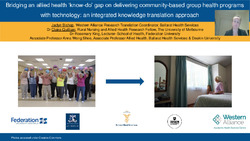Please use this identifier to cite or link to this item:
http://hdl.handle.net/11054/1812Full metadata record
| DC Field | Value | Language |
|---|---|---|
| dc.contributor | Bishop, Jaclyn L. | en_US |
| dc.contributor | Quilliam, C. | en_US |
| dc.contributor | King, R. | en_US |
| dc.contributor | Wong Shee, Anna | en_US |
| dc.date.accessioned | 2021-10-07T08:06:07Z | - |
| dc.date.available | 2021-10-07T08:06:07Z | - |
| dc.date.issued | 2021 | - |
| dc.identifier.govdoc | 01749 | en_US |
| dc.identifier.uri | http://hdl.handle.net/11054/1812 | - |
| dc.description.abstract | Background: The risk of COVID-19 transmission from face-to-face activities means alternative ways to deliver community-based group health programs (‘group programs’) are needed. Allied health practitioners at two regional health services (knowledge-partners) and local researchers adopted an Integrated Knowledge Translation (iKT) approach to review the evidence on delivering group programs with technology. This study captured knowledge-partner and researcher experiences of iKT. Method: A survey designed to explore the components of iKT was distributed to all knowledge-partners who participated in at least one iKT activity (n=25). Semi-structured interview invitations were extended to the same knowledge-partners and participating researchers (n=5). These interviews explored in depth the partnering process and perceived impact of iKT. The interviews were recorded, transcribed verbatim and analysed thematically. Findings: Six surveys and ten interviews were completed. Knowledge-partners and researchers viewed the iKT experience positively, with a strong shared urgency and purpose in answering a time-sensitive, practice relevant question. The language used by both knowledge-partners and researchers suggested that iKT was challenging to implement, due to knowledge-partner clinical workload and urgency of the research question. This resulted in a more consultative than integrated process, with greater perceived involvement by knowledge-partners in the earlier stages of iKT (shaping the research question, data collection) compared to later stages (interpreting the study findings/crafting messaging). Conclusion: Achieving fully integrated knowledge translation was challenging given the time-sensitive nature of the allied health evidence-practice gap, however the process was highly valued and beneficial for both knowledge-partners and researchers. | en_US |
| dc.description.provenance | Submitted by Gemma Siemensma (gemmas@bhs.org.au) on 2021-08-27T05:20:33Z No. of bitstreams: 0 | en |
| dc.description.provenance | Approved for entry into archive by Gemma Siemensma (gemmas@bhs.org.au) on 2021-10-07T08:06:07Z (GMT) No. of bitstreams: 1 Jaclyn_Bishop_Claire_Quilliam_3_6.pdf: 569314 bytes, checksum: ea15053b4bf68366d9b75002b74079bb (MD5) | en |
| dc.description.provenance | Made available in DSpace on 2021-10-07T08:06:07Z (GMT). No. of bitstreams: 1 Jaclyn_Bishop_Claire_Quilliam_3_6.pdf: 569314 bytes, checksum: ea15053b4bf68366d9b75002b74079bb (MD5) Previous issue date: 2021 | en |
| dc.title | Bridging an allied health ‘know-do’ gap on delivering community-based group health programs with technology – an integrated knowledge translation approach. | en_US |
| dc.type | Conference | en_US |
| dc.type.specified | Presentation | en_US |
| dc.bibliographicCitation.conferencedate | August 9-12 | en_US |
| dc.bibliographicCitation.conferencename | 14th National Allied Health Conference (NAHC) | en_US |
| dc.bibliographicCitation.conferenceplace | Online | en_US |
| dc.subject.healththesaurus | ALLIED HEALTH | en_US |
| dc.subject.healththesaurus | HEALTH PROGRAMS | en_US |
| dc.subject.healththesaurus | TELEHEALTH | en_US |
| dc.subject.healththesaurus | ONLINE | en_US |
| dc.subject.healththesaurus | COMMUNITY BASED | en_US |
| Appears in Collections: | Research Output | |
Files in This Item:
| File | Description | Size | Format | |
|---|---|---|---|---|
| Jaclyn_Bishop_Claire_Quilliam_3_6.pdf | 555.97 kB | Adobe PDF |  View/Open |
Items in DSpace are protected by copyright, with all rights reserved, unless otherwise indicated.
